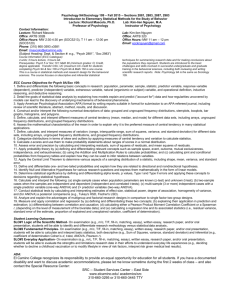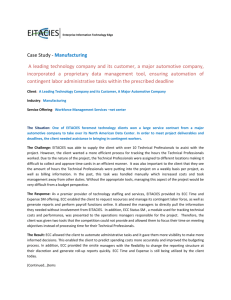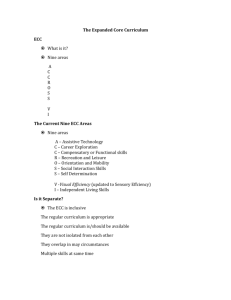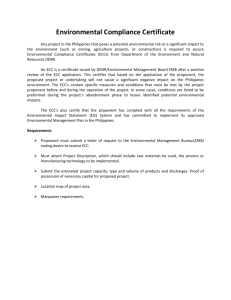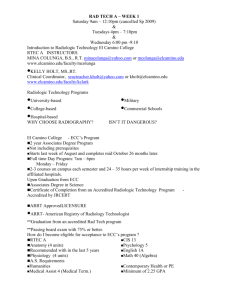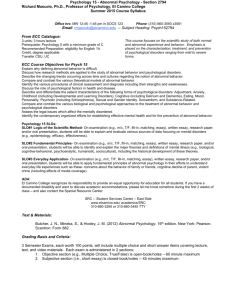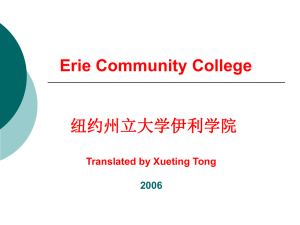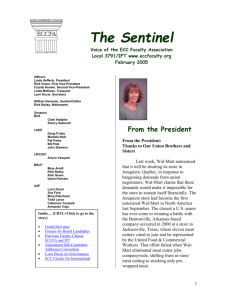Psychology 5-General Psychology
advertisement
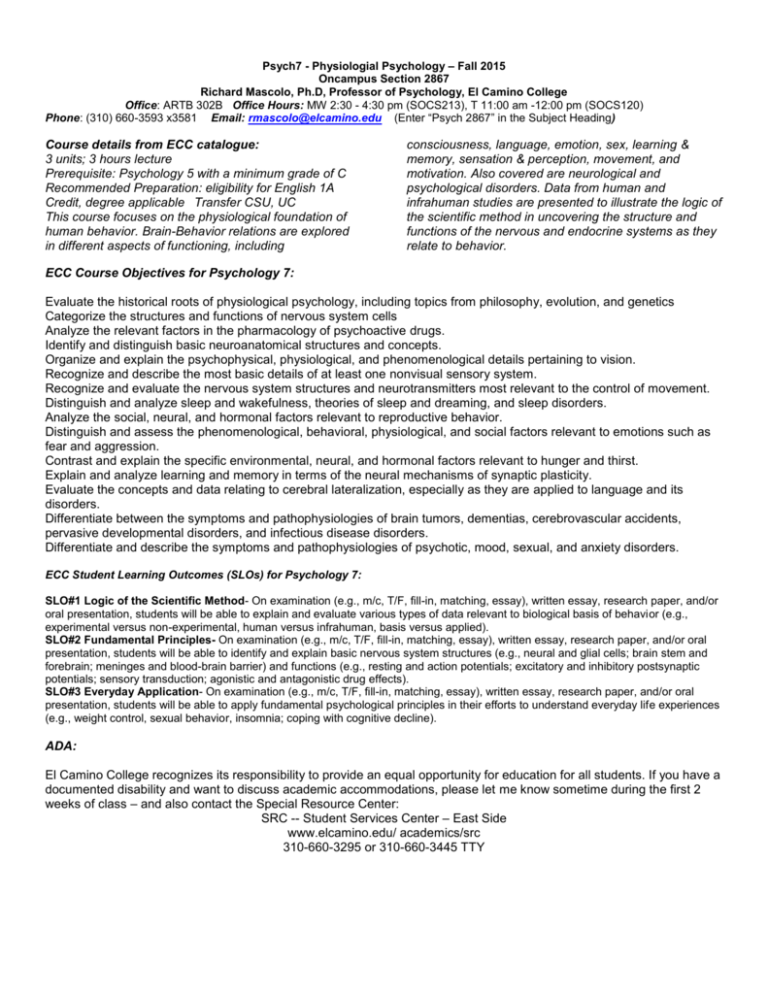
Psych7 - Physiologial Psychology – Fall 2015 Oncampus Section 2867 Richard Mascolo, Ph.D, Professor of Psychology, El Camino College Office: ARTB 302B Office Hours: MW 2:30 - 4:30 pm (SOCS213), T 11:00 am -12:00 pm (SOCS120) Phone: (310) 660-3593 x3581 Email: rmascolo@elcamino.edu (Enter “Psych 2867” in the Subject Heading) Course details from ECC catalogue: 3 units; 3 hours lecture Prerequisite: Psychology 5 with a minimum grade of C Recommended Preparation: eligibility for English 1A Credit, degree applicable Transfer CSU, UC This course focuses on the physiological foundation of human behavior. Brain-Behavior relations are explored in different aspects of functioning, including consciousness, language, emotion, sex, learning & memory, sensation & perception, movement, and motivation. Also covered are neurological and psychological disorders. Data from human and infrahuman studies are presented to illustrate the logic of the scientific method in uncovering the structure and functions of the nervous and endocrine systems as they relate to behavior. ECC Course Objectives for Psychology 7: Evaluate the historical roots of physiological psychology, including topics from philosophy, evolution, and genetics Categorize the structures and functions of nervous system cells Analyze the relevant factors in the pharmacology of psychoactive drugs. Identify and distinguish basic neuroanatomical structures and concepts. Organize and explain the psychophysical, physiological, and phenomenological details pertaining to vision. Recognize and describe the most basic details of at least one nonvisual sensory system. Recognize and evaluate the nervous system structures and neurotransmitters most relevant to the control of movement. Distinguish and analyze sleep and wakefulness, theories of sleep and dreaming, and sleep disorders. Analyze the social, neural, and hormonal factors relevant to reproductive behavior. Distinguish and assess the phenomenological, behavioral, physiological, and social factors relevant to emotions such as fear and aggression. Contrast and explain the specific environmental, neural, and hormonal factors relevant to hunger and thirst. Explain and analyze learning and memory in terms of the neural mechanisms of synaptic plasticity. Evaluate the concepts and data relating to cerebral lateralization, especially as they are applied to language and its disorders. Differentiate between the symptoms and pathophysiologies of brain tumors, dementias, cerebrovascular accidents, pervasive developmental disorders, and infectious disease disorders. Differentiate and describe the symptoms and pathophysiologies of psychotic, mood, sexual, and anxiety disorders. ECC Student Learning Outcomes (SLOs) for Psychology 7: SLO#1 Logic of the Scientific Method- On examination (e.g., m/c, T/F, fill-in, matching, essay), written essay, research paper, and/or oral presentation, students will be able to explain and evaluate various types of data relevant to biological basis of behavior (e.g., experimental versus non-experimental, human versus infrahuman, basis versus applied). SLO#2 Fundamental Principles- On examination (e.g., m/c, T/F, fill-in, matching, essay), written essay, research paper, and/or oral presentation, students will be able to identify and explain basic nervous system structures (e.g., neural and glial cells; brain stem and forebrain; meninges and blood-brain barrier) and functions (e.g., resting and action potentials; excitatory and inhibitory postsynaptic potentials; sensory transduction; agonistic and antagonistic drug effects). SLO#3 Everyday Application- On examination (e.g., m/c, T/F, fill-in, matching, essay), written essay, research paper, and/or oral presentation, students will be able to apply fundamental psychological principles in their efforts to understand everyday life experiences (e.g., weight control, sexual behavior, insomnia; coping with cognitive decline). ADA: El Camino College recognizes its responsibility to provide an equal opportunity for education for all students. If you have a documented disability and want to discuss academic accommodations, please let me know sometime during the first 2 weeks of class – and also contact the Special Resource Center: SRC -- Student Services Center – East Side www.elcamino.edu/ academics/src 310-660-3295 or 310-660-3445 TTY Required Text & Materials: Pinel, J. P. J. Biopsychology. New York: Allyn & Bacon (Pearson), 9th edition, 2014. Grading Basis: Course Percentage determines Final Grade 70% of Course Percentage: Average score of Midterm Exam (Chapter Reading & Lecture from the first half of the course) & Final Exam (Chapter Reading & Lecture from the second half of the course). Exam dates are set in the Course Schedule below. Students who miss the Midterm Exam may take a make-up version immediately after the Final Exam ends on Thursday, 12/10/15. 30% of Course Percentage: Average score on Section Quizzes (SQs) -- covering Chapter Reading & Lecture from a single chapter or portion of a chapter. SQ dates are set in the Course Schedule below. There are no SQ make-ups, but at the end of the semester each student’s 4 lowest scores will be dropped from the calculation of the SQ average score. Course Percentage = (Exam Average Score x 70%) + (SQ Average Score x 30%) The results of the formula above are used to assign Final Grades according to the following scale: Course Percentage 90 --100 80 -- 89 70 -- 79 65 -- 69 0 -- 64 Final Grade A B C D F Course Schedule: Chapter Topic 1 2 3 4 6&7 Biopsychology as a Neuroscience Evolution, Genetics, & Experience Anatomy of the Nervous System Neural Conduction & Synaptic Transmission Visual System/Perception 9 Development of Nervous System 10 14 13 &16 Brain Damage Sleep/Dream/CircRhythms Continued Hunger, Eating, & Health Continued Hormones & Sex/Language 17 &18 Emotions/ Biopsych of Psych Dis 12 Reading/ Lecture 1.1-1.7 2.1-2.5 3.1-3.6 4.1-4.7 6.1-6.6, 7.1 9.1-9.2, 9.5 Ch 1-9 10.1-10.2, 10.4 14.1-14.4 14.5-14.8 12.1-12.3 12.4-12.7 13.1-13.4, 16.1-16.3 17.1, 18.1-18.2 Ch 10–18 SQ/Exam Date SQCh1 SQCh2 SQCh3 SQCh4 SQCh67 T 9/1 T 9/8 T 9/15 T 9/29 T 10/6 SQCh9 MIDTERM EXAM SQCh10 SQCh14a SQCh14b SQCh12a SQCh12b SQCh1316 Th 10/8 T 10/13 T 10/20 T 10/28 T 11/3 T 11/10 T 11/17 T 11/24 SQCh1718 T /12/1 FINAL Th 12/10 EXAM Professor Policies: I expressly prohibit any form of copying, recording, photographing, downloading, sharing, or obtaining the contents of the Exams/Section Quizzes. This prohibition refers specifically to Section I.a.vi from ECC Board Policy 5500 Academic Honesty & Standards of Conduct. A hyperlink to the ECC Board Policy is provided below; here is an excerpt with the relevant section: “The following misconduct shall constitute good cause for discipline, including but not limited to the removal, suspension, or expulsion of a student. I. DISHONESTY a. Cheating, plagiarism (including plagiarism in a student publication), or engaging in other academic dishonesty including but not limited to…. i. Representing the words, ideas, or work of another as one’s own in any academic exercise including the use of commercial term paper companies or online sources for essays, term papers, or research papers, whether free or paid. ii. Copying from another student or former student or allowing another student to copy from one’s work. iii. Allowing another individual to assume one’s identity or assuming the identity of another individual. iv. Changing answers on a previously scored test, assignment, or experiment with the intent to defraud. v. Inventing data for the purpose of completing an assignment, a laboratory experiment, or case study analysis with the intent to defraud. vi. Obtaining or copying exams or test questions when prohibited by the instructor. vii. Giving or receiving information during an examination or test by any means such as sign language, hand signals or secret codes, or through the use of any electronic device. viii. Using aids such as notes, calculators, or electronic devices unless specifically authorized by the instructor.” Other sections from ECC Board Policy 5500 that are particularly relevant for this online course are I.a.iii and I.a.vii I have emphasized 3 specific sections of ECC Board Policy 5500 above, but all sections of the policy are enforced in this course: http://www.elcamino.edu/administration/board/boarddocs/5500 Academic Honesty.pdf This course will cover such topics as, sexuality, evolution, intelligence, ethnicity, and religion. Students who participate in this course are agreeing to respect viewpoints differing from their own (see ECC Policies below). Students who do not participate (e.g., miss multiple SQs or Exams) or who are disruptive (see ECC Policies below) may be dropped from the class by the professor. Students are responsible for keeping abreast of course announcements, including any changes in the Reading/Lecture or Dates specified in the Course Schedule. Course grades are determined solely by the Exam & SQ scores at the end of the semester. Extra credit points are built into these items – there are no other sources of extra credit points in the course. Students should independently confirm these important dates: Friday, September 4, 2015 is the last day to: 1) add full semester courses, 2) challenge residency status for current semester 3) drop for an enrollment fee refund (full semester classes); 3) drop without notation on permanent record. Friday, November 13, 2015 is the last day to drop with a “W”. ECC Policies: Students who enroll in class but do not attend the first scheduled class meeting may be dropped from the roster & their places given to waiting students who were unable to enroll at the time of registration. If illness or emergency prevents a student from attending the first class session, the student must contact the instructor. A student who registers for a class & never attends is still responsible for dropping the class. Failure to properly drop a class may result in a “W” & may subject the student for any & all fees associated with the class. Students will not be permitted to attend classes in which they are not enrolled. Exceptions may be allowed by the instructor for bonafide visitors. Students who attend a class without proper enrollment (the student did not properly register or add the class) by the published deadline will not be permitted to “late add” the class except for documented extenuating & mitigating circumstances. Students are expected to attend their classes regularly. Students who miss the first class meeting or who are not in regular attendance during the add period for the class may be dropped by the instructor. Students whose absences from a class exceed 10% of the scheduled class meeting time may be dropped by the instructor. However, students are responsible for dropping a class within the deadlines published in the class schedule. Students who stop attending but do not drop may still be retained on the course roster & receive a failing grade. Students may view their registration status on MyECC. If space is available, students who have completed registration may add a class by going to the first meeting of the class & securing permission of the instructor. It is the responsibility of the student to fulfill all requirements to add a course, & to add the course by the add deadline in accordance with college procedures. Adds will not be processed beyond the add deadline. Official withdrawal from class must be processed through the online system in the Admissions Office. Failure to complete this process may result in the assignment of a letter grade of A through F. It is the responsibility of the student to officially drop a class by the deadline date. Student Rights & Grievances Procedure 5530: http://www.elcamino.edu/administration/board/policies.asp Succeeding in this Course: Do the math: the California Community Colleges Guidelines for Title 5 Regulations, Chapter 6, Part 1 sets standards for the amount of work (measured in hours) per unit of college credit: For each hour of lecture, it is assumed that students will be required to spend an additional two hours of study outside of class. This course is 3 units, so the regulation requires 3 Lecture Hours & 6 Study Hours per week. Now we don’t actually have 3 hours of lecture – we have my lecture modules for each chapter, so the upshot is that the CCC Guidelines require that courses be designed to require between 6 – 9 hours of student work per week. How should this time be spent? Reading and Studying the assigned textbook material & my lecture notes. Notice I say Reading AND Studying. It is not enough simply to read the material—or even to read and reread the material. That is, passively taking in the authors’ words will not make the material available to you during an exam—or later in life. If you are experienced in succeeding in college courses, you know that you must work actively with the material you are required to learn. Maybe you’ve heard of the SQ3R (now the SQ4R to some), which is one system of study that promotes this approach of “active studying.” The essential feature boils down to working with the material in an active way so that you not only remember it, but you can think critically about it, e.g., questionning assumptions & conclusions, considering alternative explanations, applying principles to your life. O.K., look at this issue more pragmatically (and immediately)—actively studying the course material is the best way to pass exams! Again, it is not enough simply to read and reread the materials. As you are reading, you should be thinking about how you might be tested on the material during the upcoming exam—and whether or not you would be able to answer exam items. Read a few paragraphs and then stop—cover the material and ask yourself questions like, “What did I just read—how would I summarize this for another student in the course?” and “What kind of exam item would test this material—would I be able to answer that item?” Lastly, I want to emphasize that you are responsible for your success in this course. If you are a student who simply must have an A in this course, then your magic number is 90% – the minimum percantage needed for an A. If you’re satisfied just passing with a C, then the percentage you have to hit is 70%. My point is that you earn your grade – I don’t give it to you. Remember, there is no last-minute, end of the semester extra credit assignment that I will invent to save those who have only then realized they have not been scoring the points they need for the grade they want.
